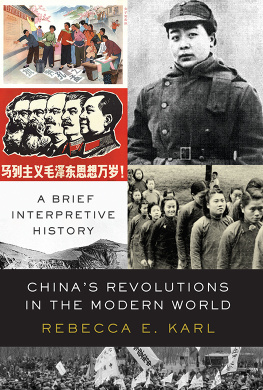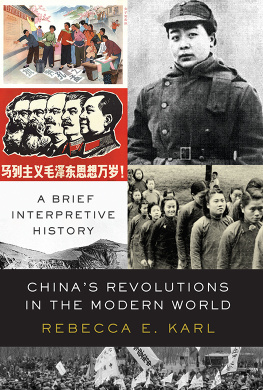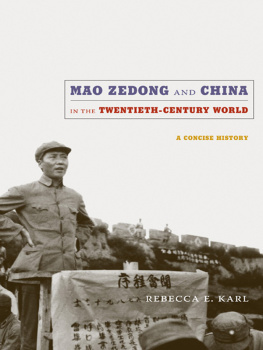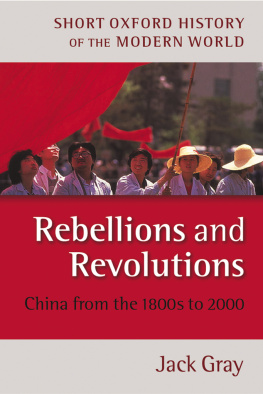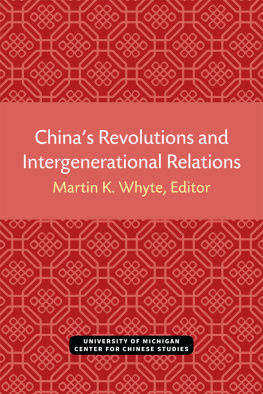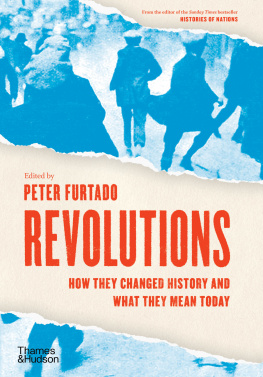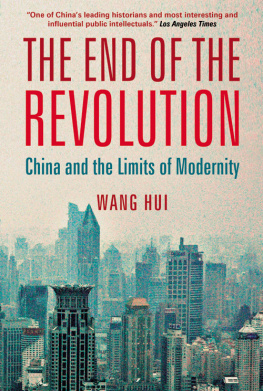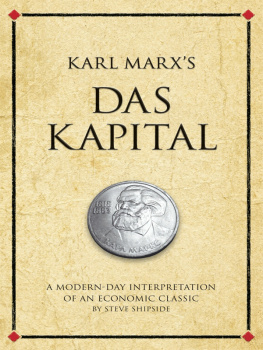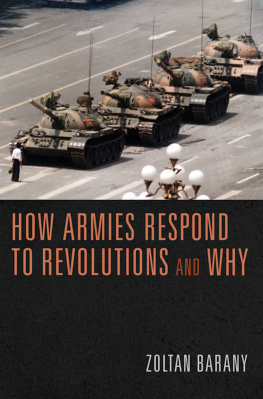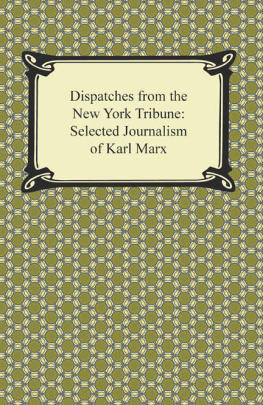Rebecca E. Karl - China’s Revolutions in the Modern World: A Brief Interpretive History
Here you can read online Rebecca E. Karl - China’s Revolutions in the Modern World: A Brief Interpretive History full text of the book (entire story) in english for free. Download pdf and epub, get meaning, cover and reviews about this ebook. year: 2020, publisher: Verso, genre: Politics. Description of the work, (preface) as well as reviews are available. Best literature library LitArk.com created for fans of good reading and offers a wide selection of genres:
Romance novel
Science fiction
Adventure
Detective
Science
History
Home and family
Prose
Art
Politics
Computer
Non-fiction
Religion
Business
Children
Humor
Choose a favorite category and find really read worthwhile books. Enjoy immersion in the world of imagination, feel the emotions of the characters or learn something new for yourself, make an fascinating discovery.
- Book:China’s Revolutions in the Modern World: A Brief Interpretive History
- Author:
- Publisher:Verso
- Genre:
- Year:2020
- Rating:4 / 5
- Favourites:Add to favourites
- Your mark:
- 80
- 1
- 2
- 3
- 4
- 5
China’s Revolutions in the Modern World: A Brief Interpretive History: summary, description and annotation
We offer to read an annotation, description, summary or preface (depends on what the author of the book "China’s Revolutions in the Modern World: A Brief Interpretive History" wrote himself). If you haven't found the necessary information about the book — write in the comments, we will try to find it.
China’s Revolutions in the Modern World: A Brief Interpretive History — read online for free the complete book (whole text) full work
Below is the text of the book, divided by pages. System saving the place of the last page read, allows you to conveniently read the book "China’s Revolutions in the Modern World: A Brief Interpretive History" online for free, without having to search again every time where you left off. Put a bookmark, and you can go to the page where you finished reading at any time.
Font size:
Interval:
Bookmark:

in the Modern World:
Rebecca E. Karl

First published by Verso 2020
Rebecca E. Karl 2020
All rights reserved
The moral rights of the author have been asserted
1 3 5 7 9 10 8 6 4 2
Verso
UK: 6 Meard Street, London W1F 0EG
US: 20 Jay Street, Suite 1010, Brooklyn, NY 11201
versobooks.com
Verso is the imprint of New Left Books
ISBN-13: 978-1-78873-559-9
ISBN-13: 978-1-78873-560-5 (UK EBK)
ISBN-13: 978-1-78873-561-2 (US EBK)
British Library Cataloguing in Publication Data
A catalogue record for this book is available from the British Library
Library of Congress Cataloging-in-Publication Data
Names: Karl, Rebecca E., author.
Title: Chinas revolutions in the modern world : a brief interpretive history / Rebecca E Karl.
Description: London ; New York : Verso, 2020. | Includes bibliographical references and index. | Summary: Chinas emergence as a twenty-first-century global economic, cultural, and political power is often presented as a story of what Chinese leader Xi Jinping calls the nations great rejuvenation, a story narrated as the return of China to its rightful place at the center of the world. In Chinas Revolutions in the Modern World, historian Rebecca E. Karl argues that Chinas contemporary emergence is best seen not as a return, but rather as the product of revolutionary and counter-revolutionary activity and imaginings. From the Taipings in the mid-nineteenth century through nationalist, anti-imperialist, cultural, and socialist revolutions to todays capitalist-inflected Communist State, modern China has been made in intellectual dissonance and class struggle, in mass democratic movements and global war, in socialism and anti-socialism, in repression and conflict by multiple generations of Chinese people mobilized to seize history and make the future in their own name. Through Chinas successive revolutions, the contours of our contemporary world have taken shape. This brief interpretive history shows how-- Provided by publisher.
Identifiers: LCCN 2019038428 (print) | LCCN 2019038429 (ebook) | ISBN 9781788735599 (paperback) | ISBN 9781788735612 (ebook ; US) | ISBN 9781788735605 (ebook ; UK)
Subjects: LCSH: Revolutions--China--History. | China--Politics and government.
Classification: LCC DS740.2 .K37 2020 (print) | LCC DS740.2 (ebook) | DDC 951.05--dc23
LC record available at https://lccn.loc.gov/2019038428
LC ebook record available at https://lccn.loc.gov/2019038429
Typeset in Minion Pro by Hewer Text UK Ltd, Edinburgh
Printed and bound by CPI Group (UK) Ltd, Croydon, CR0 4YY
For my teachers:
Arif Dirlik, Marilyn B. Young,
Harry Harootunian
We are Marxists, and Marxism teaches that in our approach to a problem we should start from objective facts, not from abstract definitions.
Mao Zedong (1942)
Ideologies must become dramas if they are not to remain mere ink printed on paper.
Antonio Gramsci (1917)
In 1926, Mao Zedong began a short consideration of class analysis in China with a query: Who are our enemies? Who are our friends? This is a question of primary importance for the revolution.answers to that question, the facts from which we begin matter a great deal.
Here, then, we can find the first of this books major approaches to the question: while modern revolutions in China have of course always been Chinese, they always have been global as well, not only because world contexts and texts helped shape the conditions of successive revolutionary struggles in China, but because those successive struggles helped constitute the contexts and texts of the modern world. From the outset, what this intertwining indicates is that revolutions are a modern global phenomenon, even as they are also a fact of and in modern Chinese history. The books second major approach flows from this: modern is not merely a chronology or description. Rather, it refers to an experience of timea temporalityand a form of historical becominga historicity. When, for example, peasant women after 1949 re-narrated their individual pasts as histories of oppression rather than as ones of gendered fate, they demonstrated, in however a state-managed fashion, that they were ready for and capable of making a future that fate may not have foretold. The conditions of the past became not a restraint on the time of the present, but rather an opening to a new experiential future.
From the mid nineteenth century onward, this transformed modern temporality and historicity corresponded, directly or indirectly, to the violently imposed connectedness of an emerging world order under an evolving global capitalist regime. This books insistence on viewing the China-global nexus through the centrality of violence and capitalism places the discussion within a particular worldview: one that reckons with the inherent structural violence of the capitalist world in which China is embedded (and that is embedded in China), and one that takes seriously that there is no pure internality or externality to modern historical inquiry. In other words, any attempt to think about the recent past in the present forces a simultaneously global and local historical perspective. In this light, for example, the Taiping Revolution of the mid nineteenth century cannot be understood without grappling with how structures of capitalist accumulation, possession, and dispossession had intruded into China in ways that did not permit even intensely local spheres of social life to escape their transformative logics. Exploring the Taipings thus entails a consideration of how various uneven preexisting and enduring systems of social, cultural, political, and economic life in China were necessarily transformedstructurally and conceptuallyin their forced confrontation with capitalist logics that exceeded their local domains. The book takes up how, as each successive revolution was mobilized and took hold in China, different parts of past organizations of Chinese life were rethought and remade in the process of conceptualizing and creating new presents, as well as new possibilities for the future.
In the last two centuries, the mutual embedding of China in the world and the world in China has been informed and shaped through a number of crises whose historical narrative contours are ever in flux. The problem of narrationWhich facts do we use to tell our story? How is the story organized? In whose voice is it told?constitutes the third and overarching approach of this book. Chinas revolutionsor, we might say, revolutions in what we know today as Chinahave, since the mid nineteenth century, raised questions about what modern China was to be as a geography or spatial entity, a polity or state, a nationality or cluster of ethnicities, a congeries of cultural entities, a class politics, a gendered sociality, and more. These questions repeatedly forced seemingly settled narratives into crisis. In the Republican Revolution of 1911, for example, the dynastic system and its Confucian ideological underpinnings were rejected as antiquated and unable to answer to the challenges of the capitalist world and its many possible futures. Having come through a century of revolutionary practice, a reworked and attenuated version of Confucian ideology has now been re-embraced by Xi Jinping in the name of the Communist Party as a way to enforce unitary cultural-nationalist pride and social obedience in a severely divided economic and ethnic environment. In presenting this history, it would be a mistake to narrate China as enacting an endless circular return to some primordial origin, or as fulfilling a linear march to a predestined goal. Rather, narrating Chinas modern historyas with all such histories in different ways and for different reasonsallows us to explore how concrete actors at particular points actively and repeatedly engaged texts from many places and times, thus compelling ideological and material encounters with traces of Chinas past that opened up new imaginings for Chinas present and future. What makes these questions modern, then, is the structurally
Font size:
Interval:
Bookmark:
Similar books «China’s Revolutions in the Modern World: A Brief Interpretive History»
Look at similar books to China’s Revolutions in the Modern World: A Brief Interpretive History. We have selected literature similar in name and meaning in the hope of providing readers with more options to find new, interesting, not yet read works.
Discussion, reviews of the book China’s Revolutions in the Modern World: A Brief Interpretive History and just readers' own opinions. Leave your comments, write what you think about the work, its meaning or the main characters. Specify what exactly you liked and what you didn't like, and why you think so.

